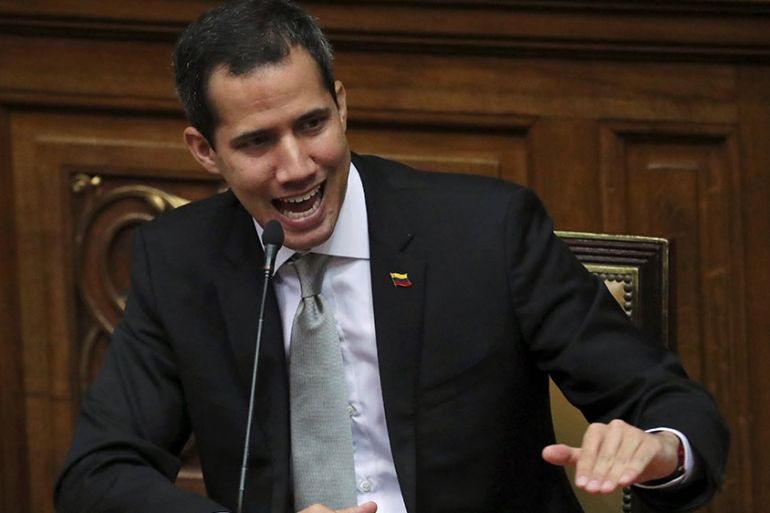OAS recognises Guaido’s envoy until new Venezuela elections held
Regional group votes to recognise opposition leader Juan Guaido’s envoy as country’s delegate in blow to Nicolas Maduro.

Caracas, Venezuela – The Organization of American States (OAS) has recognised the envoy of Venezuelan opposition leader Juan Guaido as Venezuela’s official delegate to the group until new elections are held.
The regional organisation adopted the resolution recognising Gustavo Tarre Briceno with 18 votes in favour, nine against, six abstentions and one absence, the OAS announced on Tuesday.
Keep reading
list of 4 itemsVenezuela opposition figure Guaido in Colombia ahead of summit
Venezuelan court issues warrants for new opposition leaders
Venezuelan government, opposition to resume political talks
Guaido, who considers the presidency of Nicolas Maduro illegitimate, is recognised by the United States and most of the 34 members of the OAS as Venezuela’s legitimate leader.
Maduro’s government called the OAS’s decision a “criminal and rampant violation of international law and the OAS charter”.
“The Government of the Bolivarian Republic of Venezuela reaffirms its irrevocable decision to leave the Organization of American States on April 27, 2019 … given that the Bolivarian Republic of Venezuela cannot remain in an organization that goes to its knees before the imperial interests of the US administration,” the Venezuelan foreign ministry said in a statement.
Tarre celebrated the vote on Twitter, saying: “Today we achieved the cessation of the usurpation of our chair in permanent council of the OAS. important step to achieve the objectives set by President Juan Guaido.”
Hoy logramos el cese de la usurpación de nuestra silla en el consejo permanente de la #OEA un paso importante para lograr los objetivos planteados por el presidente @jguaido pic.twitter.com/ymzOoiJ3uV
— Gustavo Tarre Briceño (@tarrebriceno) April 9, 2019
‘Maduro loses more effectiveness’
Many analysts said the OAS decision is an expected, but major defeat for Maduro.
“Although it was expected, this declaration means that Maduro loses more international support and effectiveness,” Venezuelan analyst Luis Salamanca told Al Jazeera.
“His government is not seen with the necessary tools to be acknowledged as a government, however this support cannot be translated yet in the interior as all the institutions are controlled by Maduro,” he said.
However, Salamanca also said this puts Venezuela in a surreal situation.
“We are experiencing a very severe crisis in the country, there are two different visions competing against the institutional authority,” Salamanca said.
“We have a government here that will defend a complete different vision to the one that Guaido will propose in the OAS. It’s a bicephaly that we have never witnessed before. In the OAS we have a person representing Guaido, while in the UN we still have the person representing Maduro,” he added. “In the long term if this fracture continues to deepen, we could see an effective division in the army, in the institutions, generating a severe reality for the country.”
Earlier on Tuesday, Venezuela’s ambassador to the United Nations, Samuel Moncada, said that with this decision, the US government is aiming to expel the representatives of Venezuela in international organisations and impose people “that we are not sure whom they represent exactly”.
OAS Secretary-General Luis Almagro sent a message to UN Secretary-General Antonio Guterres about the news.
“Nicolas Maduro’s presidential authority lacks legitimacy and his designations for government posts, therefore, lack the necessary legitimacy,” the message read according to the AFP news agency.
But many believe that the OAS decision will not mean much for politics inside the country.
For many years, “the government has been having confrontations with the OAS, particularly with Almagro,” said Carlos Eduardo Pina, a Venezuelan analyst.
“But this will not mean a lot in the country,” he told Al Jazeera. “The government will argue that it is a US offensive and that instead they are calling for dialogue to solve the crisis.”
The countries that voted for the OAS initiative were: Antigua and Barbuda, Bolivia, Dominica, Grenada, Mexico, Saint Vincent and the Grenadines, Suriname and Uruguay.
Gold and sanctions
Meanwhile, Reuters news agency reported this week that Venezuela has removed eight tonnes of gold from the country’s central bank’s vault. The government is expected to sell it abroad as it seeks to find cash in the face of US sanctions.
“The government is desperately looking for cash, they are trying to find new ways of recovering [their] assets,” said Jose Luis Guerra, an economist and deputy of the opposition-backed National Assembly.
Speaking to Al Jazeera, Guerra said the central bank’s reserves have been severely affected, and if the trend continues this way, it will leave Maduro’s government struggling to pay for imports of basic goods.
“The bank could collapse, and the shortages will be felt even harder,” he added.
Trump’s administration is seeking to cut off cash flow to Maduro’s government. It has imposed sanctions, including on the country’s oil industry.
“By the end of April sanctions will be felt in the country, this government won’t have the money that the oil generates, and with low reserves, this will leave it in a very compromised situation,” Guerra said. “This will be very difficult for the government and for the people.”
Venezuela’s economy is in its sixth year of recession. According to the International Monetary Fund (IMF), the economy is estimated to have shrunk by more than 30 percent between 2013 and 2017. Last year, it is believed to have declined by 18 percent.
Maduro eased restrictions on foreign exchange this year, but the economy remains desperately short of hard currency needed to import goods.
Millions have left the country in recent years, fleeing hyperinflation, unemployment, violence and the shortages of food and medicine.
Additional reporting by Alicia Hernandez in Caracas